#trans identity
Text
Identifying as.
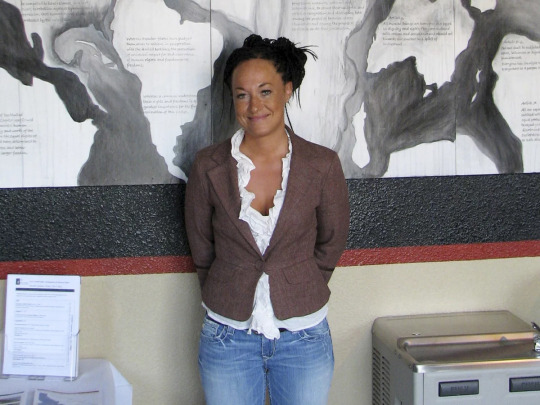
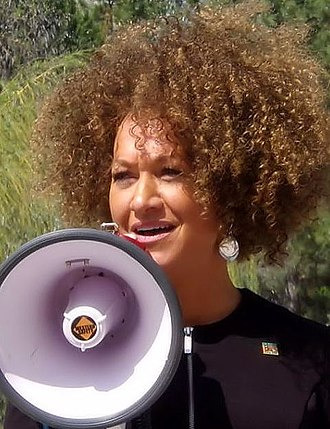
This is Rachel Dolezal, who legally changed her name to Nkechi Amare Diallo. Dolezal is a white woman who identifies as black and insists that she is transracial. Growing up, her religious white parents adopted four black babies, claiming that they "saved them from being aborted", and routinely delivered strict punishments to their kids including Dolezal. Dolezal does not seem to have a good relationship with her parents and, based on interviews, wanted to distance herself from them and distance herself from rural white culture.
"I've never questioned being a girl or woman, for example, but whiteness has always felt foreign to me, for as long as I can remember. I didn't choose to feel this way or be this way, I just am. What other choice is there than to be exactly who we are?"
She apparently "passed as black" for several years before her parents came out and said that she was white and is identifying as a black woman, and she was asked in a TV interview if she was African American and responded with "I don't understand the question". She taught Africana Studies at Eastern Washington University. She crafted a fake story in growing up as black and has argued that she experiences race-based related hate crimes. She darkens her skin and gets perms and started using hair products she observed her adopted black sibling to use. She lied about her father being black and lied that her black adopted brother was her son.
I hope that as details of Dolezal's story are read about, we are able to understand that tanning white skin does not make someone a black person, that blackface is wrong and racist. I hope we recognize that what makes someone black isn't a collection of racial stereotypes, isn't based on feeling a kinship with black people more than with white people, and that being black isn't based on not feeling a connection with white culture. I hope we understand that a black person cannot identify out of racial oppression, and that a white person cannot identify out of white privilege.

Jewel Shuping, age 38 now, was born healthy but dreamed of being blind since age 13. She stated her mother would tell stories about finding her walking down dark hallways at age 3, and mentioned that by age 6 the thought of being blind comforted her. When she was a teenager, Shuping bought a white cane and learned to read braille, becoming fluent in it by age 20.
She claims to have asked a psychologist to pour bleach in her eyes so she could fulfill her lifelong dream of being blind, and that the psychologist "understood her" and agreed to do so after giving her numbing eye drops to help with the pain (which was not ultimately helpful). She deliberately waited to seek medical attention so doctors were unable to save her eyesight. Gradually, over the course of six months, she became blind.
What Shuping has is considered a real mental health condition called Body Integrity Identity Disorder (BIID), a rare condition in which people who are born without disabilities believe with conviction that the should be disabled. There is another name for this in political activist circles, termed "transableism".
"I went blind on purpose, but I don't feel it was a choice."
Several other people with BIID are pretending to be paralyzed to use wheelchairs, with many not being driven to the point of causing harm to themselves to become disabled but instead living full lives faking being disabled.
I hope that as details of the stories of people pretending to be disabled are read about, we are able to understand that feeling like oneself should be disabled is an incredibly serious mental health condition and does not really mean that a person is "disabled inside". I hope we recognize that identifying as disabled does not make someone disabled, and that feeling a kinship with disabled people or a comfort in the thought of being disabled does not mean a person truly is or should become disabled. I hope we understand how people with mental health disorders claiming to be disabled can place further strain on resources and accommodations provided to disabled people. I hope we understand that inflicting pain, disfigurement, or physical altercations on healthy people to "help them physically match how they feel" is an inhumane way to treat a mental health condition.
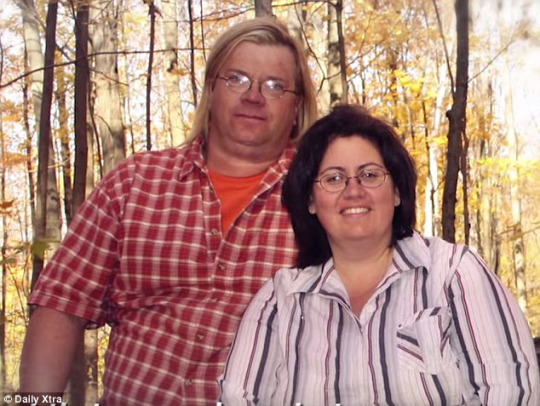
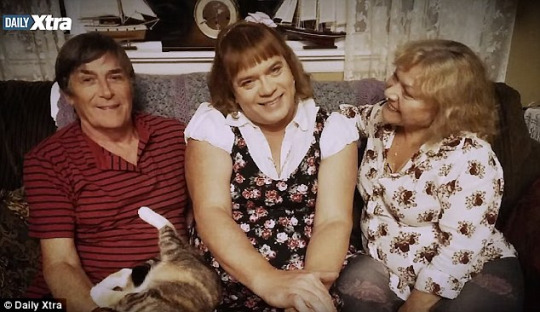
Paul Wolscht, who changed his name to Stefonknee Wolscht, was married to a woman for over 20 years and fathered 7 children before deciding to live life identifying as a six year old little girl. Living as a six year old little girl allows Wolscht to escape depression and suicidal thoughts because Wolscht gets to now play - even when in jail in solitary confinement for nine days for an undisclosed reason.
“If I’m six-years-old, I don’t have to think about adult stuff.”
Wolscht still drives and drinks coffee, but does so feeling and identifying as a six year old.

Emile Ratelband, age 69, petitioned the courts to allow him to change his age to 20 years younger because he "does not feel" 69 years old. Ratelband has argued that he did not feel comfortable with his date of birth, that age 69 did not accurately reflect his mental state, and that at age 69 he experiences limits.
“When I’m 69, I am limited. If I’m 49, then I can buy a new house, drive a different car,” he said. “I can take up more work. When I’m on Tinder and it says I’m 69, I don’t get an answer. When I’m 49, with the face I have, I will be in a luxurious position.”
Ratelband even asserted that doctors have told him he has the body of a man 20 years younger, and he said that he was willing to renounce his right to a pension. He argues that if people are able to legally change their sex on documents, there is no reason why he should not be able to change his age.
I hope that as we read these stories of people identifying as a different age, we are able to understand that feeling like you are 20 years younger or 40 years younger does not really make you that age. I hope that we understand that even though identifying as a different age might help avoid suicidal thoughts, being discriminated against on dating apps, or denied resources, it does not really change biologically what is. I hope we understand that there are also broader societal and legal consequences to being able to legally change one's age. That an adult might identify as a certain age to trick kids into trusting them so they can sexually abuse them, and/or that allowing an adult to legally consider themselves a different age would make it easier for adult predators to gain legal access to kids in environments in which they would normally be socially and legally discouraged from being in.
#trans#trans identity#transgender#trans pride#trans people#LGBTQ#lgbtq community#gender#transage#transabled#transracial#racism#ageism#sexism#ableism#disability rights#gay rights#LGB#women's rights#elder rights#mental health
808 notes
·
View notes
Text
We have a serious problem
Michael Laidlaw, MD: I'm a board-certified endocrinologist, practicing in private practice for the last 16 years. I've been studying and publishing in this area for the last 5 years, including peer reviewed journals such as Journal of of Clinical Endocrinology and Metabolism, and others. I also have a patient who is a detransitioner.
I think it's important to note that studies are shown that desistance, or growing out of this condition, of children by adulthood is very high. It's some 50-98%.
I want to be sure before I give someone a very powerful hormone like Insulin that they in fact have diabetes.
What about cancer? Before we give any powerful agents such as chemotherapeutics or surgeries, we certainly want to have physical evidence of this problem, such as biopsies or imaging.
Now, the gender affirmative therapy treatment proposed by WPATH gives very powerful hormones and surgeries on what basis? Where can we find the gender identity to be certain that these children will not desist by adulthood? Can we use imaging of the brain or blood tests, genetic testing, are there other biomarkers to ensure that we are correct? There is no such thing.
Julia Mason, MD: The Endocrine Society put out guidelines in 2017, and they were very careful in the guidelines. One, to point out that the evidence was of low and very low quality. And they also said in the guidelines that they have no idea how you identify which kids are trans and require this treatment.
And then the American Academy of Pediatrics the next year just leapt into that void and said, oh, oh, we'll tell you how you know which kids. You ask them.
Prior to 2018 I had maybe one trans patient. But then there was another one. And another one. And another one.
It wasn't until later that I started asking questions like, wait, every single kid I send to the gender clinic gets put on puberty blockers or cross-sex hormones. Just, it was happening immediately.
Patrick Hunter, MD: This affirmative model of care has spread wildly in the last 8 years. Now we have objective, unbiased systematic reviews. These systematic reviews tell us the evidence for youth transition is poor quality, and with very low certainty for benefit.
In JAMA Pediatrics, there was a study reported from Northwestern University in Chicago. Patients ranged in age from 13 to 24 years. The authors concluded that mastectomy was beneficial and should not be delayed in youth. What lead them to that conclusion? The finding that 3 months after surgery, the 36 patients were happy with their flat chests. They lost 9% of their surgical cases to follow-up. Nine percent. In 3 months.
It is absurd, meaningless to draw any conclusions after 3 months.
This paper is indicative of the quality of research we have in this field, published in our most prestigious journals.
We have a serious problem.
#gender ideology#queer theory#medical transition#desistance#detrans#sex trait modification#genderwang#detransition#trans identity#cross sex hormones#wrong sex hormones#puberty blockers#poor research#medical malpractice#medical scandal#medical corruption#endocrinology#low quality#ideological capture#ideological corruption#religion is a mental illness
910 notes
·
View notes
Text
Due to the recent hate messages it has been brought to my attention that my identity is unclear. In light of this, I will spell it all out for you- Im an intersex trans queer person.
To elaborate: dyke who uses he/him pronouns while being a he/she (not they). I'm a testo-butch nonwoman boydyke who is also a gay man for the right person. I'm like if butch was its own gender and then that gender was expanded upon then flipped upside down. I'm 100% trans man + 100% butchdyke gender fucked bi guy at the same time.
So basically, I'm a Bi-Lesbian DykeMan tbutch - hope this helps!
#boydyke#trans identity#transgender#trans ftm#trans masc#lots of labels#queer#lgbtq#nonbinary identity#nonbinary trans man#transmasc
276 notes
·
View notes
Text

#women deserve better#radfem#radblr#radical feminism#feminism#radfems do touch#radfems do interact#radfems please touch#womens rights#sex based rights#transgender#tra receipts#peak trans#transwomen are men#trans identified male#trans identity#gender ideology#trans cult#gender critical#women first#I could post stuff like this 24/7 for the next ten years so be grateful that I‘ve got other stuff to do as well#these males are scum#old but gold
454 notes
·
View notes
Text
TRULY think we need to standardize the term "cis-identifying" in The Discourse
tired of hearing the claim that "trans-identifying" invalidates their identity etc etc & them rly just not grasping why we use it, why it isn't intended as a specific attack toward trans identity, just an incidental byproduct of us not sharing their ideology. "trans-identifying" wasn't created to invalidate, but to literally recognize their identity, as desired, while not being dishonest about our dissent from gender identity ideology.
"cis-identifying" also allows us to be more clear when we speak about believers of this ideology, bc as I find myself constantly saying, TRA is not a synonym for trans; TRA doesn't include all trans ppl or even all trans-identifying people (I differentiate bc I know gender critical transitioners who don't refer to themselves as the opposite sex or anything, ie dysphoric males whove medically transitioned and call themselves exactly that), and TRA most definitely includes a lot of cis-identifying people.
the term cis-identifying indicates what we've been told "cis" means, but limits itself to those who embrace the ideology and, resultingly, the term. someone who subscribes to gender identity ideology and believes their internal gender identity corresponds with their "agab."
using BOTH versions of these terms (trans identity and cis identity, trans-identifying and cis-identifying, etc) serves to specify that we see both of these labels equally as part of an ideological set of beliefs we simply don't subscribe to. it helps clarify that we don't believe in "cisgender" any more than we do any other gender identity.
i just think it's useful, and I've found it useful a few times since I started using it, though admittedly that was pretty recently
idk if this is gonna make sense to anyone but me. lmk gyns
#mine#radblr#gender identity ideology#GII#cis-identifying#trans-identifying#cis identity#trans identity#gender ideology#terfblr
142 notes
·
View notes
Text
The way Leslie Feinberg talks about the women's liberation movement in Stone Butch Blues (I think in chapter 13?) really fucking resonated with me and made me go oh shit because this is what we've never recovered from. This line that says you must fit into the conventions that is either 'man' or 'woman' but only ever in the way other people describe for you.
We had this for the gay lib movement, third wave feminism, the debates about lesbian sex ethics, modern trans debates. Its why we hate women who are masculine and men who are feminine, its why we hate drag performers and any trans person who doesn't perfectly pass as cisgendered. Its why nonbinary is only accepted if you can be seen as woman-lite. We are still culturally clinging to the differences between the binary sexes instead of deconstructing the ways compulsory gender has harmed most of us.
I think we need some serious thinking about the nuances between freedom to express and cultural gender identity, how we can enjoy butch/femme identities without forcing them into a new binary all over again, and ALSO about how specifically lesbian trauma around cismen affects how we treat and see masculine presenting women, butches, and the trans*/nonbinary people in our community.
#butch lesbian#butch4butch#queer history#stone butch blues#leslie feinberg#he him lesbian#trans identity#transfem#transmasc#nonbinary lesbian#femme4butch#femme lesbian#queer media#queer studies
81 notes
·
View notes
Text
Trans "women" are either:
1. Perverted misogynistic men with degradation kink who see femininity as the highest form of degradation
2. Gay men with the levels of internalized homophobia so high that they would rather pretend to be a woman in a het relationship than to be a gay man in a homosexual relationship
3. Autogynephiles
#radfem#radical feminism#radfem safe#radblr#radfems do interact#feminism#radfems do touch#adult human female#trans#trans women#trans identity#trans idetified men#transgender#transsexual#tra#tim#lgbt#lgbtqia#trans misogyny#autogynephilia#internalized homophobia#homophobia#woke homophobia#misogyny#mine
273 notes
·
View notes
Text
Something, I just realised that really resonated with me about Gwen in Across Spiderverse, is her clothing.

When around non-spiderfolk adults and at home she wears loose fitting clothing which seems androgynous and hides the shape of her body.

But, when with Miles and her spider friends, she dresses in tight clothing. She’s clearly comfortable with her body when around friends but she seems to feel the need to hide her figure around people outside her friend group.
Similarly, I struggle with my body and didn’t wear shorts or tight fitting clothing for many years because I had problems with how masculine my legs and torso looked due to body hair and my wide shoulders.
These traits caused much dysphoria until I made more accepting friends when I became more comfortable with wearing shorts, tight tops, jeans and even leggings. My dysphoria became less severe around them because I knew they saw me as a girl. I even realised that some of my features were rather feminine like the shape of my legs and hips (though I don’t have curves) so I started empathising them making me appear more feminine and womanly. My shoulders are also not broad compared to most men and it bacame obvious my dysphoria had been exaggerating certain features.
Whilst at home though, or out with family, I wear baggy clothing which, whilst isn’t masculine, hides my shape so no one can tell my sex because I’m scared of my family’s reaction to seeing me in feminine clothing. Simultaneously, I feel less comfortable because I know they will always see me as a boy.
I know many cis girls and boys, especially in their teens. have body image issues and feel more comfortable showing their figure around friends but, to me, Gwen’s choice of outfits, and how they shape her, is very trans. A lot of cis girls (not all) will still dress fem around family but just not in clothes which emphasise their shape but Gwen chooses to dress androgynously around her dad and is more comfortable showing her shape around friends. Of course, it is her choice how she dresses but there’s a definite contrast between her clothes around friends and her clothes around her dad.
This is just a reading and I don’t know how intended it was but I thought it was a cool and fun approach which I found in this video. (Apologies the link can’t be copied here for some unknown reason so here’s a screenshot.) They cover a lot of readings of the film involving queer theory, race theory and comic history.


Also can we just appreciate how cool Gwen looks in every scene. The gender envy is so strong. <3
#lgbtq#transgender#queer#trans spiderman#trans#trans experience#trans clothing#trans pride#trans girl#trans identity#trans media#trans representation#trans dysphoria#gender dysphoria#queer friend groups#spider woman#spiderman across the spiderverse#spiderman#trans spider gwen#trans gwen#trans body positivity#queer pride#queer coding#pride#transgirl#transfem#trans women are amazing#trans woman#transgurl#across the spiderverse
239 notes
·
View notes
Text
The trace joy of eating your cultural foods <3
#domiposts ´ˎ˗#radqueer positivity#radqueer#radqueer safe#transabled#transid please interact#transid safe#pro radqueer#pro transid#transid#trace#transjapanese#trans identity#transx#transrace
124 notes
·
View notes
Text
if you can’t clearly define what a woman is, and you reject every radical feminist who can clearly define what a woman is, how do you know you are one?
#radblr#radfems please interact#radfem safe#adult human female#gender critical#female only spaces#gender inclusive#all inclusive#million dollar question#trans women#trans dogma#trans men are not men#trans women are not women#trans identity#drop the t
561 notes
·
View notes
Text
man like what even is anything
i've been thinking a lot recently. i'm in a contemporary art and gender class, and we did our masculinity studies class like right before we started our trans studies unit and i'm just trying to think. why am i even trans? yes, i feel very much drawn to traditional ways of expressing my gender masculinely. having a deeper voice, facial hair, boxy build, etc, is how i want my body to be. but like, that doesn't necessarily make me a man*. what does masculinity even mean? the features in which i wish to acquire aren't masculine within themselves. they can be utilized in androgynous and feminine ways; deep voices or hair or a boxy build are not inherently masculine. by that i mean, any who has these features is not automatically a masculine person.
so like. what am i doing? (more under the cut)
i know what i am doing makes me happy, and i'm not questioning my transness itself in the slightest. i know for a fact that i am trans, and HRT has been one of the best decisions i've ever made. but trying to break down ideas of gender makes me wonder how different i would feel if gender were not a part of our society. would i still want to undergo treatment? would i always feel like there was something missing? would i want the testosterone based secondary sex characteristics? i am not undergoing HRT because i feel like i am a man and that is what men do. i am undergoing HRT because testosterone secondary sex characteristics are how i want to express Me. that's how i feel like i should exist. but would i feel the same if i didn't have a gender identity? i feel like my wish to express myself masculinely does inform my gender identity, and not the other way around.
gender just doesn't really make sense to me. anything you try to claim that it is, there is always something that is going to contradict it. whenever you try to attribute a certain trait to a certain gender, you can always find that trait in other people who are a different gender. it is just so deeply personal to everyone, i personally believe everyone has their own gender. even two cishet people of the same gender are going to experience their gender identity differently. so where is the divide? when does a personality trait become part of your gender identity? which traits even fall under gender identity? does gender even need to be involved at all? is a future without using gendered language to describe ourselves achievable? is that something we even want to achieve? what is gender and what is expression?
does any of this make any sense? does anyone else feel this way? i want to open up this discussion to anyone, no matter your experience with gender.
*i say man, in this context, in reference to myself, as shorthand for "masculinely gendered person." i am not, in the traditional sense, a man, but refer to myself as such for the sake of argument and not being overly wordy with my stream of consciousness.
#lgbt#lgbtq#lgbtq+#lgbtqia+#gay#queer#transgender#trans#nonbinary#enby#trans identity#identity#gender studies
49 notes
·
View notes
Text
Trans research and scientific consensus
(2020) - Study of 139,829 students finds that in comparison to other students, transgender identity, especially non-binary identity, is associated more with perpetrating bullying than being bullied. Non-binary identity was most strongly associated with involvement in bullying, followed by [transgender] opposite sex identity and cisgender identity.
(2023) 21 leading experts on pediatric gender medicine from 8 countries wrote a letter to Wall Street Journal expressing disagreement over how gender dysphoria in youth is treated, voicing concerns against things such as the affirmative model and research conducted outside of the US has found hormonal interventions for gender dysphoria to be without reliable evidence. Among these international experts is Dr. Rita Kaltiala, chief psychiatrist at Tampere university gender clinic and author of several peer-reviewed studies on trans medicine and Finland's top authority on pediatric gender care.
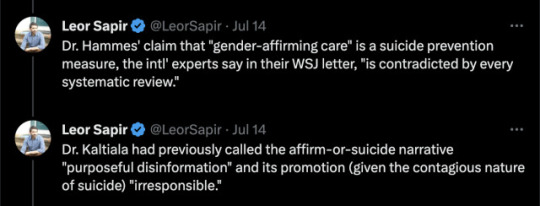
(2023) Landmark study from Denmark on 3,800 transgender patients pulled data from hospital records and applications from legal gender changes and discovered 43% of this group had a psychiatric illness compared with 7% of non-trans group, and despite "gender affirming care" and legal gender changes, still had 7.7 the rate of suicide attempts and 3.5 times the rate of suicide deaths. Researchers state this rate is likely even higher due to missing data.
(2016) Study finds association with increased risk of multiple sclerosis for trans women taking estrogen/reducing testosterone levels.
(2023) Metadata study shows, at best, no improvement for patients in gender-affirming care. "The conclusions of the systematic reviews of evidence for adolescents are consistent with long-term adult studies, which failed to show credible improvements in mental health and suggested a pattern of treatment-associated harms. Three recent papers examined the studies that underpin the practice of youth gender transition and found the research to be deeply flawed. Evidence does not support the notion that “affirmative care” of today’s adolescents is net beneficial."
(2011) Long term follow up of 324 transgender people having undergone sex reassignment surgery in Sweden, found that trans women retained male patterned incidents and rates of violence and had a greater significance and rate of rape and sexual violence than cisgender men. The study also found, "Persons with transsexualism, after sex reassignment, have considerably higher risks for mortality, suicidal behaviour, and psychiatric morbidity than the general population. Our findings suggest that sex reassignment, although alleviating gender dysphoria, may not suffice as treatment for transsexualism, and should inspire improved psychiatric and somatic care after sex reassignment for this patient group."
(2020) Largest study to date on 641,860 people finds association with autism and "gender diversity", "Gender-diverse people also report, on average, more traits associated with autism, such as sensory difficulties, pattern-recognition skills and lower rates of empathy — or accurately understanding and responding to another person’s emotional state".
(2022) US study examining 10 years of data on 952 people finds large percentages of young adults prescribed hormones for trans identity no longer getting the drugs 4 years later. Discontinuation rate for both sexes combined = 30%. Female discontinuation rate as high as 44%. The standard disinformation pushed is that only 1-2% of people who begin medical transition end up desisting. But these figures show that in this cohort of young adults, the overall rate of discontinuing hormone treatment ranged from a low of 10% to a high of 44% within a space of just 4 years.
Abruzzese et al. 2023 'The Myth of “Reliable Research” in Pediatric Gender Medicine: A critical evaluation of the Dutch Studies—and research that has followed'
More to come.
#trans#transgender research#transgender health#trans health care#gender critical#detrans#desistance#detransition#FTM#MTF#non binary#gender studies#gender identity#LGBTQ#trans identity#gender diverse#autism#gender dysphoria#gender affirming care#gender affirmation#transitioning#protect trans kids#protect trans youth
453 notes
·
View notes
Text
By: Anonymous
Published: Oct 16, 2023
When my first son claimed he was trans, I eagerly ‘affirmed’ him. When his three-year-old brother decided he wanted to be trans, too, I realized I’d made a terrible mistake.
I was a social-justice organizer and facilitator before social justice took over the progressive world. I was at the nascent movement’s forefront, introducing the concept of intersectionality to organizations and asking people to share their pronouns.
My friends and I felt like we were the cool kids, on the vanguard of the revolutionary wave that would change the world. We were going to achieve what people in that milieu call “collective liberation.”
Within this context, I came out as a lesbian and identified as queer. I also fell in love, entered a committed relationship, and gave birth to a son. Two years later, my spouse gave birth to our second son.
Having children and experiencing the love and devotion I felt toward them, was a game changer for me. I began to experience internal tensions. My thinking was split between what I felt instinctively as a mother; and what I “should” be feeling and doing as a white anti-racist social-justice parent.
Because I’d felt victimized by my parents’ rejection of my sexuality, I wanted to make sure to honor my own children’s “authentic” selves. In particular, I was primed to look for any clues that might suggest they could be transgender.
My spouse and I raised our sons with gender-neutral clothes, toys, and language. While we used he/him pronouns, and others called them boys, we did not call them boys, or even tell them that they were boys.
In our everyday reading of books or descriptions of people in our lives, we did not say “man” or “woman”; we said “people.” We thought we were doing the right thing, both for them and for the world.
Even when our first son was still young, he already struck us as different from other boys—being both extremely gifted and unusually sensitive. By age three or so, he started to orient more toward the females in his life than the males. “I like the mamas,” he would say.
We started to attribute some of this difference to the possibility that he was transgender. Instead of orienting him toward the reality of his biological sex by telling him he was a boy, we wanted him to tell us if he felt he was a boy or a girl. As true believers, we thought that we should “follow his lead” to determine his true identity.
At the same time, I was taking a deep dive into the field of attachment and child development. This made me understand that attachment is hierarchical; and that parents, not children, are meant to be in the lead. This obviously conflicted with my insistence on letting my child decide his gender. Sadly, it was the latter impulse that won the day.
At around age four, my son began to ask me if he was a boy or a girl. I told him he could choose. I didn’t use those words—I imagined that I was taking a more sophisticated approach. I told him, “When babies are born with a penis, they are called boys, and when babies are born with a vagina, they are called girls. But some babies who are born with a penis can be girls, and some babies born with a vagina can be boys. It all depends on what you feel deep inside.”
He continued to ask me what he was, and I continued to repeat these lines. I’d resolved my inner conflict by “leading” my son with this framework. Or so I told myself.
His question, and my response to it, would come back to haunt me. In fact, I remain haunted to this day. To the extent I was “leading” my son anywhere, it was down a path of lies—an on-ramp to psychological damage and irreversible medical interventions. All in the name of love, acceptance, and liberation.
About six months later, he told my spouse that he was a girl and wanted to be called “sister” and “she/her.” I received a text message about this at work. On the way home that night, I resolved to put all my own feelings away and support my transgender child. And that is what I did.
We told him he could be a girl. He jumped up and down on the bed, happily saying, “I’m a girl, I’m a girl!” We—not our son—initiated changing his name. We socially transitioned him and enforced this transition with his younger brother, who was then only two years old and could barely pronounce his older brother’s real name.
When I look back at this, it is almost too much to write about. How could a mother do this to her child? To her children?
Once we made this decision, we received resounding praise and affirmation from most of our peers. One of my friends, who’d also socially transitioned her young child, assured me that this was a healthy, neutral way to allow children to “explore” their gender identity before puberty, when decisions would have to be made about puberty blockers and hormones.
We sought out support groups for parents of transgender children, so that we could find out if we’d done the “right thing.” It hadn’t escaped my notice that our son hadn’t exhibited any signs of actual gender dysphoria. Was he actually transgender?
At these support groups, we were told, again, what good parents we were. We were also told that kids on the autism spectrum (which our son likely is) are gender savants who simply know they are transgender earlier than other kids.
At one of the support groups we attended, we were also told that transgender identity takes a few years to develop in children. The gender therapist running things told us that during this period, it’s important to protect the child’s transgender self-conception—which meant eliminating all contact with family or friends who didn’t support the idea that our son was a girl. I believed her.
Looking back, I now see her comments in a shockingly different light: this was part of an intentional process of concretizing transgender identity in children who are much too young to know themselves in any definitive way. (One set of parents attending the group had a child who was just three years old.) When identity is “affirmed” in this manner, children will grow up believing they are actually the opposite sex.
The therapist endorsed the same approach that many adolescents use on their parents, who are urged to write letters to grandparents, aunts, and uncles to announce the child’s transgender identity. In these letters, the conditions of continued social engagement are made clear: Recipients must use the new name and new pronouns, and embrace the new identity, or they will be denied contact with the child.
After about a year of social transition for our older son, our younger son, who was by now only three years old, began to say he was a girl, too. This came as a complete shock to us. None of the things that made our older son “different” applied to our younger son. He was more of a stereotypical boy and didn’t show the same affinity for the feminine side of things that his older brother did.
The urge for “sameness” is a primal attachment drive in many family members. We felt that our younger son’s assertion of being a girl likely reflected his desire to be like his older sibling, in order to feel connected to him.
His claim to be a girl became more insistent when both brothers went to school part-time, because their program included pronoun sharing. Why could the older sibling be a “she” when the younger sibling couldn’t? Our younger son became more insistent, and we became more distressed.
We made an appointment to see the gender therapist whom we’d met at the support group. We truly believed that she would be able to help us sort out who, if anyone, was actually transgender.
To our shock, the therapist immediately began referring to our younger son as “she,” stating that whatever pronouns a young child wants to use are the pronouns that must be used.
She patronizingly assured us that it might take us more time to adjust, since parents have a hard time with this sort of thing. She added that it was transphobic to believe there was anything wrong with our younger son wanting to be like his older transgender sibling.
When I pushed back and asserted that I wasn’t yet convinced our younger son was in fact transgender, she told me that if I failed to change his pronouns and honor his newly announced identity, he could develop an attachment disorder.
We were unconvinced. But, again, we wanted to do what was right for our son and for the world. We decided to tell him he could be a girl. And that night at dinner, we told him that we would call him “she/her.”
Right after dinner, I went to play an imaginary game with him, and I wanted to be affirming. So I put a big, warm smile on my face and said, “Hi, my girl!”
At this, my younger son stopped, looked at me, and said, “No, mama. Don’t call me that.” His reaction pierced me to my core. I didn’t turn back after that.
For the next two years, my partner and I dug deeper, agonized, and then continued digging again. Everything we thought we knew or believed that had led us to socially transition our older son began to unravel.
I continued to study the attachment-based developmental approach to parenting and learned more about autism and hypersensitivity. We decided not to socially transition our younger son. Not only was he not transgender, we now realized, but our older son probably wasn’t either.
He was just a highly sensitive, likely autistic boy who saw a girl identity as a form of psychic protection. It also provided him a way of attaching to me through sameness.
My spouse and I decided that since we’d been the ones who’d led him down this path, we were the ones who needed to lead him off of it.
A year ago, just before our older son’s eighth birthday, we did just that. And while the initial change was hard—incredibly hard—the strongest emotion exhibited by our son turned out to be relief.
In the days following my first conversation with him about going back to his birth name and pronouns, during which I told him that males cannot be females and that we were wrong to tell him he could choose to be a girl, he got very mad at me, then sad. Then, the next day, I felt my son rest. I felt him release a burden, an adult burden that he, as a child, was never meant to carry.
Since that time, we’ve all been healing. My son is now happy and thriving. We’ve watched him come to a deeper peace with himself as a boy.
Our younger son is also thriving. Once his older brother became his older brother again, he happily, and almost immediately, settled into his identity as a boy.
I feel like someone who’s escaped a cult—a cult whose belief system is supported by our mainstream culture, the Internet, and even the state.
I fear for the future—the future of sensitive, feminine, socially awkward boys. I fear what the world will tell them about who they are.
But no matter what the future holds, I will never ever stop fighting to protect my sons. I am no longer a true believer.
#gender ideology#queer theory#genderwang#gender cult#social transition#autism#social justice#critical social justice#affirmation model#gender affirming#gender affirmation#trans identity#gender identity#child psychology#religion is a mental illness
111 notes
·
View notes
Text
Making Differences
Long post. tl;dr: you never know where your earnest words may end up, and what they might accomplish, so keep putting them out there. (Also: I wrote a guide to nonbinary identities a little over two years ago and I’m still very proud of it.)
Back in August 2020, I emailed my day job line manager: “Hey, so, I’ll be coming back to work [after the world’s worst-timed unpaid, year-long sabbatical] in three weeks... we should probably have a plan...?”
He agreed, and decided to do a long-overdue video call that week. In our defence, we’d had a lot of Other Things to think about in that period.
Approximately 15 seconds before the call connected, I remembered that my beard had been growing out for about 6-8 weeks by that point and was not something you could pass off as a trick of the light, if you were so minded. What would this nice, supportive, but ultimately cishet, Christian, family man have to say about my incontrovertibly gender non-conforming appearance? I’d never even told him about being non-binary, always swerving when conversation got close to the topic.
Arrgh.
As the video image expanded, he leaned into the screen, put one hand to his own hairy chin (very different from the clean-shaven man of memory) and said “Huh. It’s not as good as mine!”
Me: “Well, uh, hah, to be fair, you’ve had longer to, uh, develop yours.”
Him: “How long have you been growing yours then?”
I’m not sure that there could have been a better response, if I’m honest.
We moved onto different topics after that but, like a two-ring circus, I was chatting about the departmental shifts, the changes in personnel, how everyone was coping with permanently working from home... and thinking: “Could I finally come out completely at work? Like: COMPLETELY? Would that... I hadn’t even... what...?!” and said, just before signing off, with utter lack of articulacy, that it would be good to talk about, uh, pronouns, and changing them in work, sometime.
“Oh. Okay.”
We worked the mechanism out between us, me slowly revealing my new appearance to close colleagues one at a time, most of whom were either a) relieved that I wasn’t telling them I’d suffered horrendous burn scars (thanks for that very specific leap of imagination!), b) cis men complaining mildly that my beard was better, or c) having to be dragged back a step from the notion that I was transitioning to a man and would be changing my name, etc., d) or some combination of the above. And then we decided to use November 2020’s National Coming Out Day as a good point to aim for. I was already set to write an article about coming out as nonbinary for the organisation’s LGBT+ Network (due to be shared generally with anyone in the business who cared to read it or any of the others for that day – apparently mine made some people cry).
In the meantime, I searched out the announcement that a former colleague’s line manager had made to the business when she came out as trans and forwarded it to mine – here’s a good template, and yes: the annoucement coming from you will help legitimise it. At which point, it became clear that my boss and colleagues were going to need some further guidance from me.
“I was thinking of writing a thing about how to use pronouns...”
“Oh!” He was nakedly relieved. “Yes, pronouns. That would be great. Thanks!”
No problem. I knew how to use my own, and how to communicate that clearly. No worries. One page about ze/zir/zirself, with a general background on neopronouns. Coming right up.
It occurred to me that I didn’t know whether any of my (ostensibly uniformly cishet) colleagues had any idea why why someone would use third person singular pronouns other than she/her or he/him, so I added in a bit about nonbinary identities. A couple of pages should be fine, right? The nonbinary identity section grew, and split into subsections: definitions, history, legacy, how much more common such a thing is in cultures other than “Western” ones.
Maybe it needed more context. After all, to understand nonbinary, you probably need to understand binary trans identities. A new section blossomed.
In order to understand transgender identities, you need to understand gender identity. Okay. Another section. Let’s throw in all the definitions re: sex, gender, cis, trans, nonbinary... with some links to other resources.
You know what this needs? Diagrams (id in alt-text). And a contents page. And a glossary.
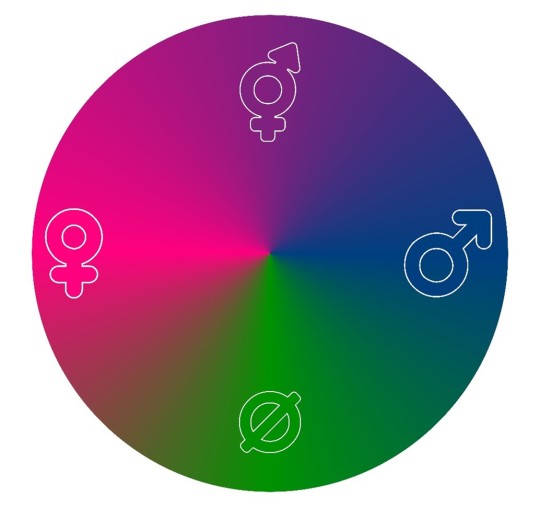
Honestly, I’m amazed it’s only thirteen pages long...
Anyway, thing is: it’s gone a LOT further than any of us ever imagined. It started with people on Facebook saying “Well, I don’t understand [non-binary people/ the need for gender-neutral language]!” in various groups/ on other friend’s posts, so I’d sweetly offer them the guide. (Turns out treating what can look like huffy denial as a good faith request for more information (with bonus diagrams) gets many more positive results than you’d imagine.) Then I idly posted the link in a couple of more friendly places. And THEN it started getting weird. “Can I share this with my colleagues?” Sure. “Can I bring this to my kids’ school?” Go for it. “I’d like to circulate this as a resource at the NHS Trust I work for.” Uh. Okay! “So, I saw [the guide] on Twitter. Can [organisation I greatly admire] use that as guidance for our organisation?” Buh, uh, yeah! Please! “My wife is a prison psychiatrist, may I share it with her?” Blimey. By all means.
And then the more personal stories started coming back: “You made me realise something about myself.” “I shared this with my family and they understood.” “We’re in love and your paper helped me reconcile that.”
Wow.
This little guide has gone a lot further than I ever imagined it might.
Today a senior colleague told me, in passing:
fwiw I shared your pronoun guide with my (very old white cis hetero) choir and it has generated SO many good questions
so there are choir grandkiddos all over the world thanking you for their grandparents being more awesome
Which, considering I was braced for an awkward business change management conversation, was not where I was expecting to end up this afternoon, emotionally speaking.
If I was doing this from scratch now, I suspect there would be differences (a longer glossary; an excursion into intersex identities, maybe? definitely better diagrams...), but then, a lot of what I know now came from doing the research for the guide, so maybe not so much! But one thing is for sure: I’m never going to take the impact of words shared freely quite so lightly in future.
#nonbinary#non-binary#queer#lgbtq#lgbt#lgbtqia+#trans things#trans identity#guide#long post#anecdote#fay speaks#essay
393 notes
·
View notes
Text
I should not have to say this!
As an autistic person, it is ableist to all autistic people (diagnosed or not) to claim you are transdisabled.
As a person of color, it is racist to claim you are trace.
It’s also impossible to be transspecies but I shouldn’t have to explain that.
I shouldn’t have to explain any of this because these things should be common knowledge.
If you want an explanation you can ask for one but you have to know the issues that these people face, not because they choose what race to be or choose to be disabled but because they were born like that.
You are part of the oppression we face.
43 notes
·
View notes
Note
<33333 you're wonderful, amazing, and incredibly strong and resilient. you've done more for lgbt people than all of the people throwing hate at you combined.
thank you, love ❤️ I know this for a fact. I know for a fact I've done and STILL do more for trans people than ANYONE on here coming for me 🤷 I've personally arranged and/or paid for healthcare including expensive HIV medications, housing, food, doctor's appointments, clothing, and more for homosexual AND TRANS people in need in my community. I've used my connections to get welfare resources for homosexual AND TRANS people they otherwise either couldn't access or would have had to wait months for. I've paid for and legally facilitated the name change of more than one trans acquaintance. I have opened my home to unhoused gay AND TRANS young adults to ensure they had shelter and food and safety and access to medicine, and paid for motel rooms for unhoused lgbt people for weeks or months while they waited for an opening in the shelter (which I also got them on the list for, sometimes when they didn't even technically qualify, using my connections as a Pulse survivor).
I've helped several LGBT young adults in need learn adult skills including how to drive, how to find and then apply & interview for jobs, how to check their vitals and what the dangerous ranges are, basic first aid, CPR certifications, harm reduction in cases involving substance misuse, how to find good medical providers & advocate for themselves to doctors/insurance, how to obtain and navigate medical insurance, how to apply for an apartment rental, how to apply for college or in one case even grad school, how to set boundaries and speak up for their needs, how to get documents changed, and much more.
I'm not wealthy, either, I did all of this while living paycheck to paycheck and struggling to feed myself. I did all this voluntarily, separate from charity organizations or guidance, on my own initiative. I found ways. I always found ways bc it mattered to me. I routinely used my unique connections as a Pulse survivor (esp connections to the lgbt resources who assisted us in the aftermath, but also to politicians like Carlos Guillermo Smith and Anna Eskamani who most of us survivors know personally) to help lgbt people in need. and what do the people who claim to be the real trans activists do? harass and threaten me anonymously online.
What can the homophobic "pro trans" assholes in my inbox honestly say they have done for trans people? Sent SA & death threats to a woman who actually helps them bc she says sex-based oppression is a real thing with material consequences? 10/10 insane thought process.
I'm tired of it.
EDIT 12.28.2023 - Please see full version of this post with my vitally important follow-up reblogs here.
#mine#radblr#ask#radfem safe#radfem friendly#trans identity#gender ideology#non anon ask#non anon#Pulse survivor#pulse nightclub#pulse shooting#anon love
225 notes
·
View notes